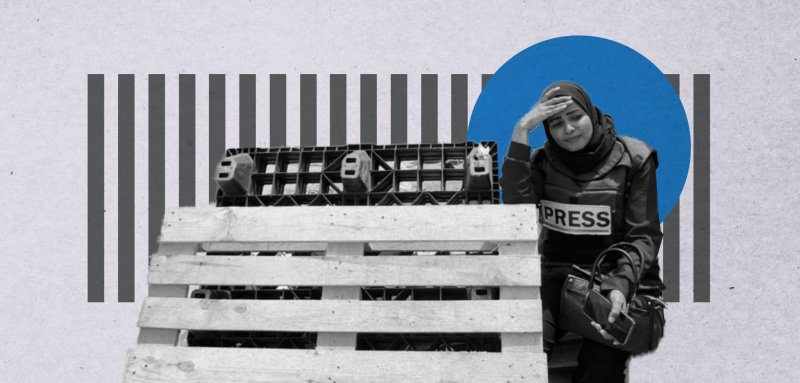**Editor's note: Doaa Shaheen, our Gaza correspondent, has been displaced nine times since the start of the war on Gaza, from the Jabalia refugee camp to Rafah. After the invasion of Gaza, Shaheen was displaced to Al-Nuseirat refugee camp in the center of the strip. Just a few days after writing this report, Shaheen was injured by an Israeli airstrike, and was pulled out alive from beneath the rubble of the house she was sheltering in.
After becoming repeatedly displaced since the start of Israel’s most recent and ongoing war on Gaza, Rafah has become the final refuge for Gaza’s journalists; This last tent of displacement is the place from which the image of genocide is spread across to the world.
However, with the invasion of the city and the distribution of leaflets with notices to evacuate, Gaza’s last remaining journalists have packed their tents and belongings and once again, been forced to flee, without knowledge of their next destination.
Press camps in Rafah now appear completely empty, which has led to a halt in media coverage of the city. Most of Gaza’s journalists have now been displaced to the courtyard of Al-Aqsa Martyrs Hospital in Deir al-Balah, from which they continue their brave quest to reveal the truth.
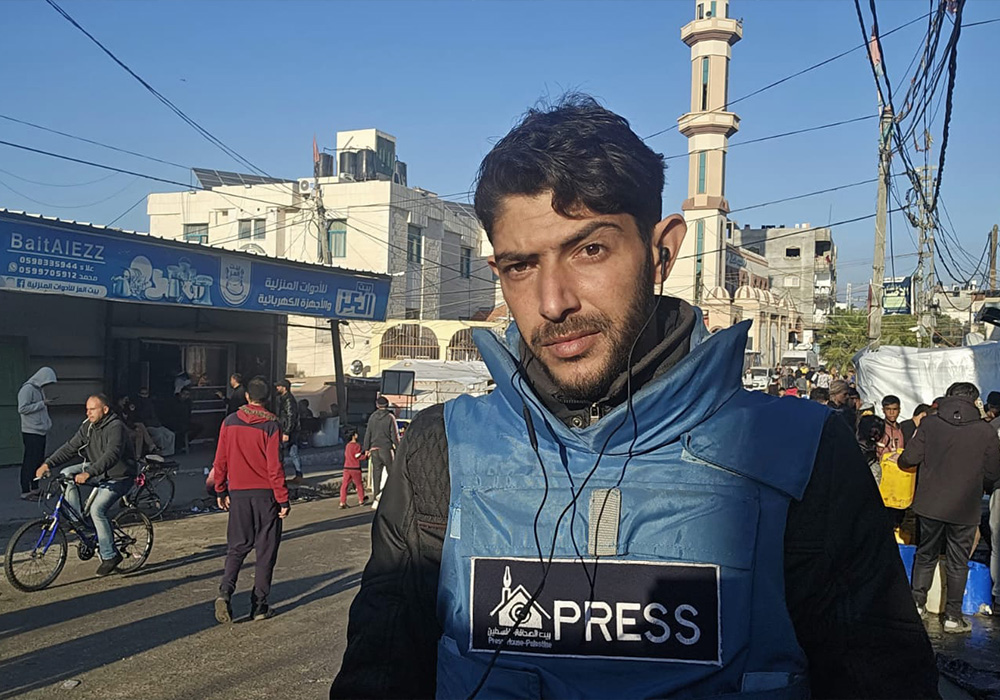 Journalist Samer Al-Za’anin
Journalist Samer Al-Za’anin
Gaza’s journalists continue to suffer, both personally and professionally. Gaza has the highest indicators of press freedom violations to date, with 142 journalists targeted, over 100 media institutions destroyed, and 10 broadcast-equipped vehicles belonging to global and international television media channels destroyed, according to the Palestinian Journalists Forum.
"We did not leave Rafah voluntarily; we were forced to leave under fire and bombardment."
Will images of Rafah reach?
"We did not leave Rafah voluntarily; we were forced to leave under fire and bombardment. This was after the occupation issued orders to evacuate it and began its ground attack," journalist Samer Al-Za’anin told Raseef22.
The wave of journalists forcibly displaced from Rafah has resulted in a lack of media coverage from Rafah.
"We hoped that our displacement to Rafah would be the final displacement, and that we would later return to northern Gaza to work from our offices, despite the fact that they were destroyed. But, unfortunately, we are being displaced again, to central Gaza, where we will face even more hardship," added Al-Za’anin, originally from Beit Hanoun. Al-Za’anin continues to juggle displacement with his duties as a journalist and his role as a father, ensuring that his family have food and shelter. In addition to securing food and water for his family, he must dismantle and set-up the tent at each new displacement station, and transport his journalism equipment to the press camps in the courtyard of Al-Aqsa Martyrs Hospital in Deir al-Balah in central Gaza.
Shorouq Shaheen, 30, another journalist, was temporarily residing with a group of other female journalists in a tent in Rafah. After the invasion of Rafah, the group was forced to pack up their belongings and equipment and move, with no knowledge of their next destination.
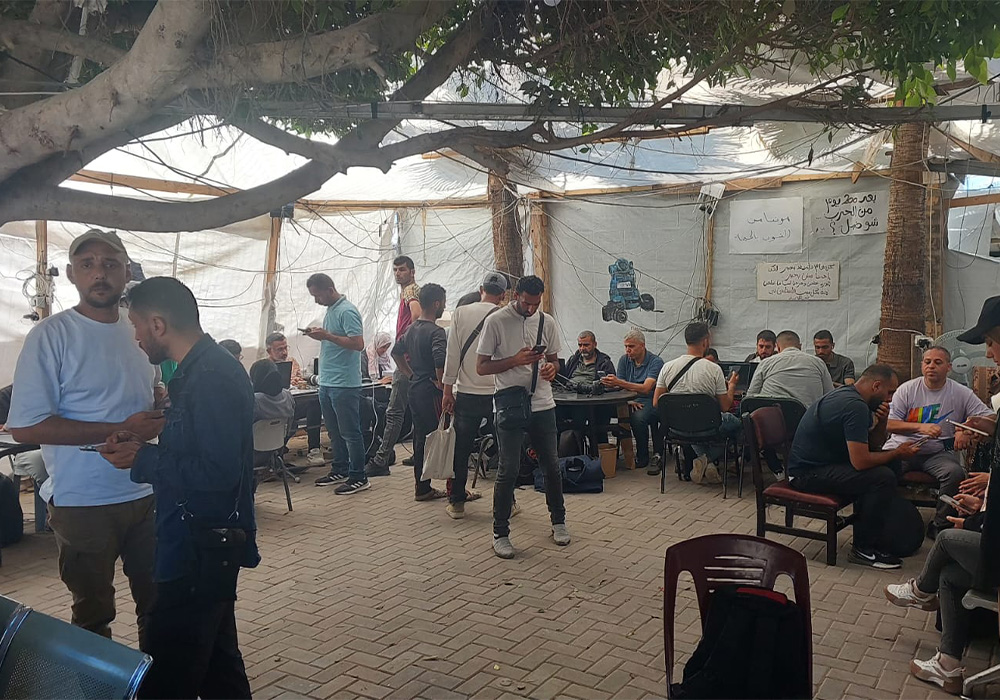 Journalists tent in front of Al-Aqsa Martyrs Hospital, Deir al-Balah
Journalists tent in front of Al-Aqsa Martyrs Hospital, Deir al-Balah
The women found it extremely difficult to find transport to their new site of displacement.
"I was anxiously following talks of a Rafah invasion. I often asked my colleagues in the tent: Where will we go? We don’t have the energy for another displacement," shared Shaheen.
She adds, "We were hopeful and optimistic about our return, especially after Hamas agreed to ceasefire proposals, but after we woke up to yet another evacuation order, we were shocked by Israel’s escalation in Rafah."
Every time Shaheen is displaced, she is forced to begin from scratch. "There is no place to put my belongings, press equipment, and personal items. After receiving the evacuation orders, I paused media coverage for several hours, and ultimately, for two whole days."
After the orders were issued, Shaheen began to search for a new place to move to, one with network, internet and broadcasting equipment. One of her colleagues offered a temporary tent until she could find a place to settle.
Meanwhile, she has been looking for a nearby place for her family, so she can visit them freely and rest at night. Since the start of the war, Shaheen has not been able to visit her family often, due to the demands of her role as a journalist.
“Journalism in Gaza is difficult and complicated. We work with limited resources and face continuous displacement, moving through streets, rooftops, and hospital courtyards, all the while we are facing starvation, dehydration and death.”
Coverage amidst repeated displacement
For most journalists, these most recent evacuation orders from Rafah mark a second, third, or perhaps fourth displacement.
Al-Za’anin explains, "Each time we are displaced, my suffering returns. My first displacement was from Al-Shifa Hospital last November, after it was stormed by the occupation. I lost my journalistic equipment and relied on borrowing a camera, microphone and mobile phone from colleagues who managed to hold onto their equipment. But it's not just about losing equipment, we have also lost so many of our colleagues who have been on the ground with us since the start of the war, some of whom we have known and worked with for years."
He adds, “Journalism in Gaza is very difficult and complicated. We work with limited resources and amidst continuous displacement, moving through streets, on rooftops, and in hospital courtyards, all the while we are facing starvation, death, and dehydration.”
Despite this, Al-Za’anin emphasizes that he will continue to report on the genocide until his last breath. He considers it a national duty and a necessary message to relay to the global community.
Shorouq Shaheen comments on her repeated experience with displacement, "After the occupation bombed our media offices, we were initially displaced to Al-Shifa Hospital. We were shocked after the occupation threatened to bomb it, so we moved, once again, to Al-Aqsa Martyrs Hospital, which in turn, they also threatened to bomb, before we finally evacuated to Nasser Hospital in Khan Younis."
She continues, "Once at Nasser Hospital, we still did not catch a break from the suffering and displacement, and we were forced to flee again under a barrage of shells. We fled to Rafah, across from the Kuwaiti Hospital, thinking it would be our final stop. Then came the evacuation order, and once again, we are displaced and in a state of pain, fatigue, and heartbreak."
Despite the constant threat of death, lack of equipment, and incessant bombing, Gazan journalist Samer Al-Za’anin emphasizes that he will continue covering the genocide until he takes his last breath. He sees it as a national duty and a message he must convey to people across the world.
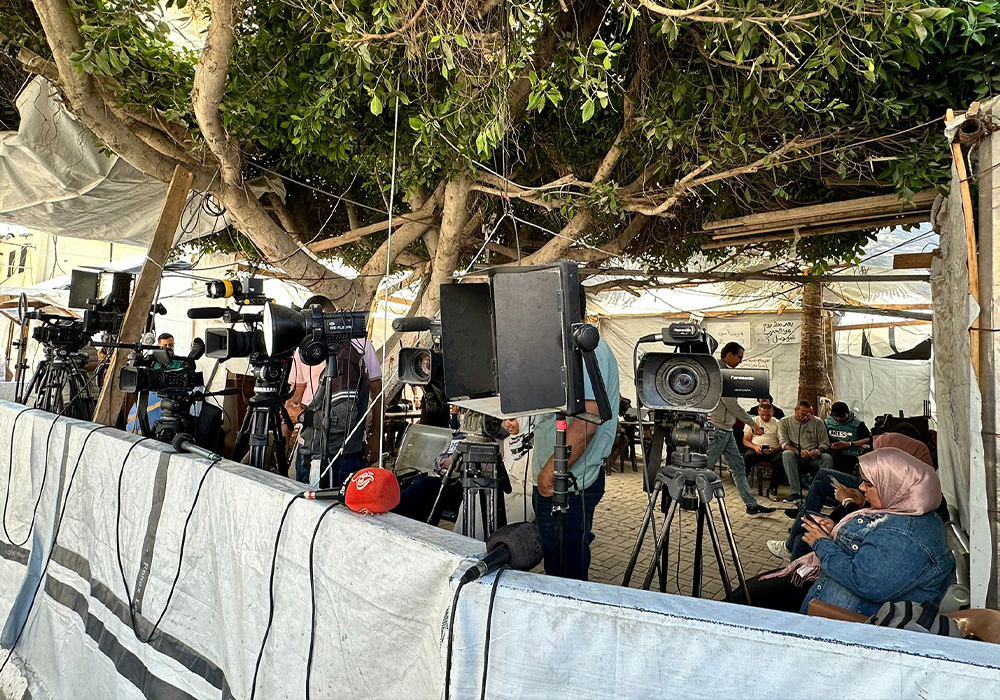 Journalists tent in front of Al-Aqsa Martyrs Hospital, Deir al-Balah
Journalists tent in front of Al-Aqsa Martyrs Hospital, Deir al-Balah
Journalist Mothers
Nour Swirki, 36, a reporter for Al-Sharq TV, has also been greatly affected by displacement. The exhaustion is visible on her face, as she shares, "Life is hard inside the tent at Al-Aqsa Martyrs Hospital. We couldn't find enough space to set up our tent in the courtyard due to the number of journalists' tents. We found ourselves in a cramped tent with no ventilation, after a colleague took pity on us and allowed us to stay the night."
Swirki describes displacement as “horrific… [it is] absolutely horrific to be homeless for nearly eight months and to miss the simplest details of a decent life”.
While Swirki decided to stay in Gaza to continue reporting, she chose to send her children away – a decision she does not regret. Having her children with her would have forced her to fight to secure shelter and daily needs for them, at a time when finding shelter for one is quasi-impossible. She admits that this situation has made her feel inadequate as a mother.
The ethics of media dictate that a journalist's life is more important than the news which they are reporting. But this concept is missing in Gaza, because journalists are at constant risk of being targeted; even their homes are unsafe.
How does the displacement of journalists differ from that of civilians?
Mohammed Al-Lahham, Chairman of the Freedoms Committee of the Palestinian Journalists Syndicate, asserts that the occupation is violating journalists in Gaza with premeditation and deliberation.
"This is evident, they directly kill them, kill their families, and destroy their workplaces and homes, leading to repeated forced displacement, putting them at great risk," Al-Lahham tells Raseef22.
According to him, the ethics of media dictate that a journalist's life is more important than the news which they are reporting. But this concept is missing in Gaza, because journalists are at constant risk of being targeted; even their homes are unsafe.
"12% of the total 1,200 journalists working in Gaza have been targeted. This indicates the occupation's continued targeting of journalists as part of its policy to conceal the truth, because the press has succeeded in exposing Israel’s true colors," Al-Lahham emphasizes.
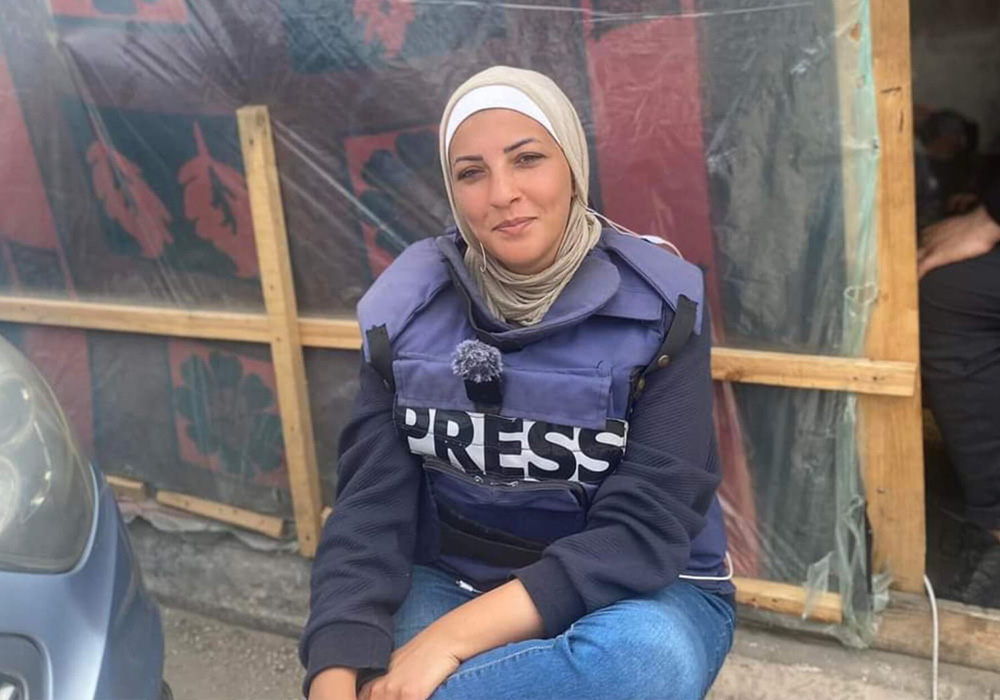 Nour Swirki, Palestinian journalist, feminist and human rights defender
Nour Swirki, Palestinian journalist, feminist and human rights defender
Nour Swirki describes it as “horrific, absolutely horrific to be homeless for nearly eight months and to miss the simplest details of a decent life.”
Al-Lahham condemns the great psychological, professional, and social toll of displacement, especially given the lack of financial means of many journalists to pay for transportation, to cover the loss of press equipment, the exposure to bombing, and the lack of electricity they need to continue coverage and communication with their media institutions.
"All this adds to their suffering, and in addition, they must also search for food, a place to sleep and secure certain basic needs. These factors affect their journalistic work, and delay the delivery of their media message," Al-Lahham adds.
However, Gaza’s surviving journalists are united in their determination, which drives many of them to risk their lives, day after day,in order to convey the truth.
Raseef22 is a not for profit entity. Our focus is on quality journalism. Every contribution to the NasRaseef membership goes directly towards journalism production. We stand independent, not accepting corporate sponsorships, sponsored content or political funding.
Support our mission to keep Raseef22 available to all readers by clicking here!
Interested in writing with us? Check our pitch process here!
